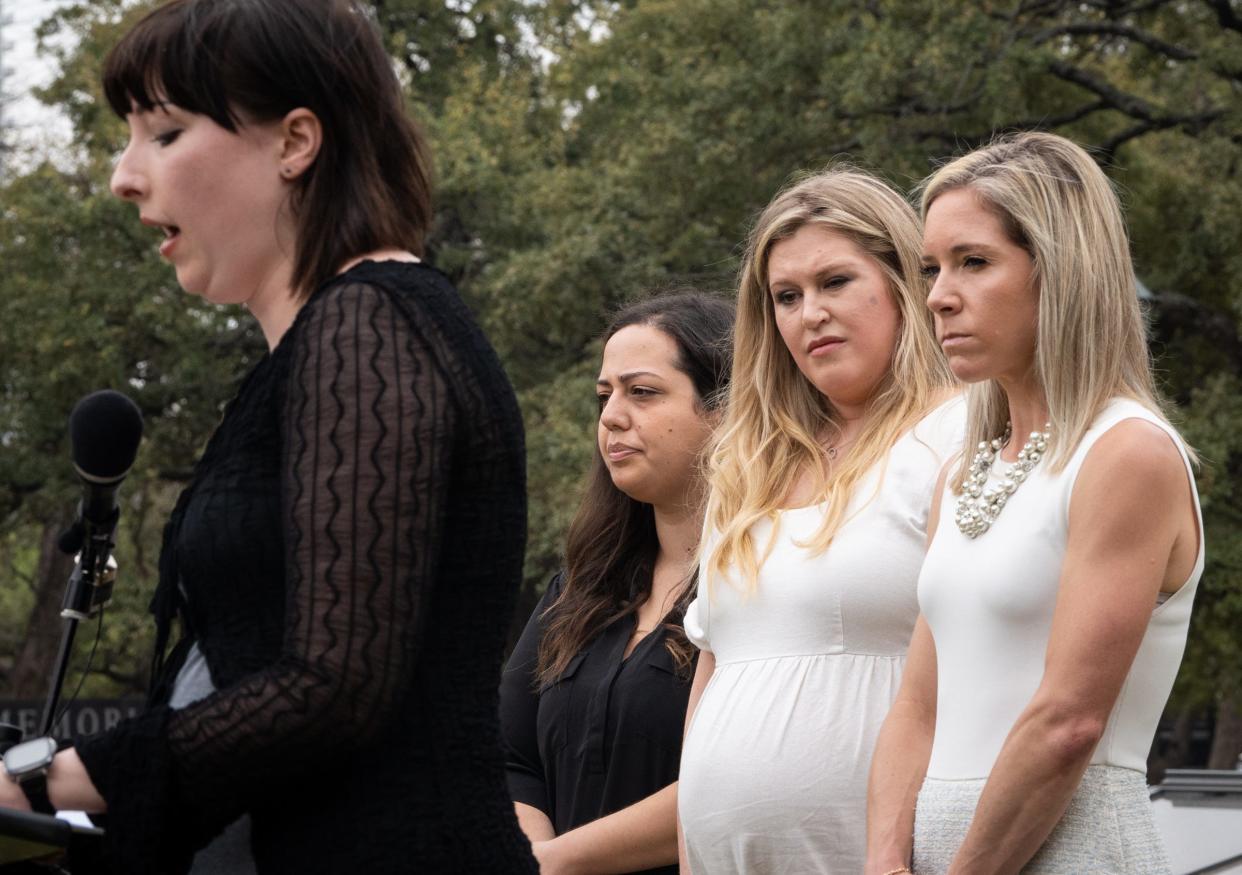Texas women, doctors ask Austin judge to clarify exceptions to state's abortion ban

A Travis County state judge is hearing arguments this week on Texas’ abortion ban and whether the law goes far enough in outlining the medical exceptions that allow a patient to terminate a pregnancy to save their life.
The two-day hearing in front of state District Judge Jessica Mangrum in Austin represents a major legal test to the state’s abortion ban and comes just weeks before the one-year anniversary of the ban’s implementation on Aug. 25.
Mangrum, a Democrat elected to the bench in 2020, is likely to issue a written ruling in the coming weeks. No matter what she decides, the highly politicized case seems destined to be decided by the state's Supreme Court, which is made up of Republicans.
Texas’ abortion ban, which went into effect after the U.S. Supreme Court’s decision last year to overturn Roe v. Wade, provides an exception only to save the life of the patient. But lawyers for 15 patients and medical providers who are suing the state say the law is vague and conflicting, does not show which medical conditions apply, and provides no timeline for death before a doctor can provide care to terminate a pregnancy.
In Texas, abortions were nearly illegal even before the Supreme Court's decision, after state lawmakers passed a bill in 2021 that prohibited the procedure after about six weeks of pregnancy.
Grumet: Ever so quietly, Texas tinkers with abortion bans to protect patients' lives
Lawyers in the Texas attorney general's office are defending the law as written and are asking the court to dismiss the suit. During opening statements Wednesday, Amy Pletscher, an attorney with the attorney general's office, said the exceptions to an abortion are clear and stressed that medical providers are to blame for refusing to provide abortion care in compliance with state law.
“Some who failed to act within the standard of care, some who simply failed to act within the desires of the patient, and some who failed to act at all,” Pletscher said.
Medical providers in Texas who provide an abortion deemed to be illegal are subject to prosecution for a first-degree felony, a fine of $100,000 or more, and loss of their license to practice medicine.
The female plaintiffs, who are represented in court by eight lawyers, are asking the judge for a temporary injunction to give medical providers discretion on when to recommend an abortion. In opening statements, Molly Duane, a lawyer for Center for Reproductive Rights, said the lawsuit stops short of requesting a full repeal of the abortion ban. As such, no matter which side wins, abortions are expected to remain illegal for nonemergency reasons.
More: Former Texas abortion clinic opens in New Mexico. Now, new ads are targeting Austinites
The hearing will continue Thursday with additional plaintiff witnesses followed by state witnesses, including an OB/GYN that the defense said will testify that the law is clear.
It remained uncertain Wednesday whether Mangrum will allow the plaintiffs to introduce a letter to the state medical board from Sen. Bryan Hughes, R-Mineola, that requests guidance to medical providers on a condition known as preterm premature rupture of membranes, or PPROM. The condition is when the sac surrounding the baby ruptures before a viable birth. Mangrum said she would rule on the letter’s admissibility later in the hearing.
The hearing is expected to end Thursday afternoon. A decision from Mangrum could come down at any point thereafter. The losing side will likely appeal the ruling to the Austin-based 3rd Court of Appeals, whose six justices are all Democrats and, from a political sense, might be more sympathetic to the plaintiff's argument. From there, the case could make it to the Texas Supreme Court, whose judges are chosen through statewide election and are all Republicans.
In opening the hearing Wednesday, witnesses provided emotional testimony about not being able to get an abortion even after a provider informed them that their child would not survive. Before lunch, court staff rushed to the witness stand after Samantha Casiano began coughing and vomiting after she read from a physician's letter addressed to her that said her pregnancy was incompatible with life. Casiano’s pregnancy was complicated by anencephaly, a birth defect in which a baby is born without parts of the brain and skull. The child died shortly after birth.
Mangrum ordered the court in recess, and Casiano left the courtroom sobbing.
After the break, the court heard from Dr. Damla Karsan, a plaintiff in the lawsuit.
Karsan, an OB/GYN in Houston, testified that, except for the most extreme cases, it’s hard for a physician to know when a patient’s life is in trouble to the point that an abortion is needed.
“I’m not sure legally what is sufficient,” Karsah said, adding, “We need clarity, and patients need access to care.”
Grumet: Tragedies mount for women with ill-fated pregnancies under Texas' abortion bans
The hearing began with testimony from Amanda Zurawski, an Austin woman who spent three days in intensive care last August after her water broke prematurely and she was denied an abortion. Zurawski testified that she developed sepsis, a life-threatening condition, and sustained permanent damage to her reproductive organs that could prevent her from getting pregnant again.
Zurawski, the lead plaintiff in the case, accused the state of inflicting further trauma on her by suggesting in a legal filing that she does not have standing in the lawsuit because physically she might still be able to get pregnant.
“The fact they’d use that against me really speaks to their character,” she said.
This article originally appeared on Austin American-Statesman: Women, doctors ask judge to clarify exceptions to Texas' abortion ban

